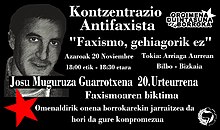Basque-origin Spanish politician and journalist (1958–1989)
Josu Muguruza |
|---|
 |
| Born | Josu Muguruza Guarrotxena
1958
|
|---|
| Died | 20 November 1989 (aged 30–31)
Madrid, Spain |
|---|
| Cause of death | Assassination |
|---|
| Burial place | Bilbao |
|---|
| Occupation | Journalist |
|---|
| Political party | Herri Batasuna |
|---|
Josu Muguruza (1958–1989) was a Basque journalist and politician who was assassinated in Madrid on 20 November 1989. Muguruza was among the leaders of Herri Batasuna, a Basque nationalist political party. He was about to serve at the Spanish Parliament for the party when he was killed.
Biography
Muguruza was born in Bilbao in 1958.[1] He received a bachelor's degree in information sciences.[2] He was a journalist by profession[1][3] and worked as an editor-in-chief of Egin newspaper.[2] He was elected as a deputy from the Herri Batasuna in the 1989 general elections.[4]
He had a daughter, Ane Muguruza.[5] She was born two weeks after the murder of his father.[1]
Assassination
Muguruza was assassinated in Madrid on 20 November 1989 before he received his certificate of election.[4] He was dining at a restaurant of Hotel Alcalá.[5] The perpetrators were the members of an anti-ETA group known as GAL.[4] Ricardo Sáenz Ynestrillas, a member of the neo-fascist group, Spanish Social Movement (Movimiento Social Espanol), was arrested and tried for his alleged involvement in the killing of Muguruza, but soon released due to the lack of evidence.[6] Later a former police officer, Ángel Duce Hernández, was arrested on 2 August 1990 and was sentenced to 100 years for the murder of Josu Muguruza.[7] Duce was killed in a traffic accident in Alcorcón in August 1997 while he was using a six-day prison permit.[7]
Funeral and legacy
A funeral ceremony was held for Muguruza in Bilbao on 23 November 1989.[8] A monumental sculpture was erected in his honor in Bilbao.[9]
The day, 20 November, Muguruza was assassinated has been commemorated by the Basque people since on the same day another Herri Batasuna leader Santiago Brouard was assassinated in 1984.[10]
